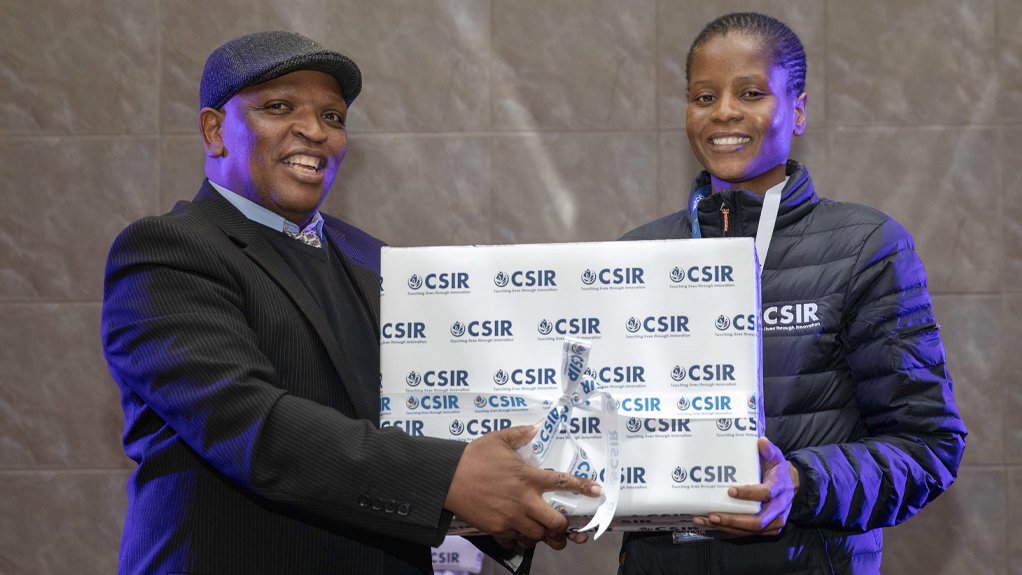CSIR acknowledges eight young scientists for innovative research solutions


CSIR strategic partnership manager Dr Ndumiso Cingo hands a prize to emerging researcher Vivey Phasha
The Council for Scientific and Industrial Research (CSIR) recently recognised eight young scientists for their scientific research work at the seventh Emerging Researchers Symposium (ERS) hosted at its Pretoria campus.
These young scientists were selected to battle it out for the best innovative research solutions to the challenges faced by society.
The ERS, hosted under the theme “Innovation in Entrepreneurship”, provided 39 young researchers with the platform to demonstrate how their scientific research responds to the needs of industry, small and medium-sized enterprises and underserved communities, through oral and poster presentations.
The ERS was initiated to showcase the work done by emerging researchers at the CSIR, who include candidate researchers, researchers, individuals on the postgraduate bursary programme, students in the studentship programme, as well as postdoctoral programme candidates.
One of the young researchers recognised for having the best poster presentation was Vivey Phasha (35), whose poster presentation highlighted an anti-pigmentation product technology developed by the CSIR and the University of KwaZulu-Natal, which has proven to have a competitive advantage over existing cosmetic products in the market.
“In proving that the developed technology is effective against pigmentation, the CSIR optimised the production of Kojic acid and used it as a starting material to synthesise a stable derivative,” she said.
A cytotoxicity assay was then conducted on Vero cells to evaluate the safety of the produced compounds, resulting in novel compounds, which may be used to produce well-tolerated skincare products.
These compounds can be incorporated into cosmeceuticals for use by humans.
“This has a huge impact on the cosmetic industry and will have a significant outcome in low- and middle-income countries,” said Phasha.
Of four emerging researchers acknowledged for their oral presentations, PhD candidate Khavhatondwi Netshiheni (30) was selected for her scientific investigation into the effect of consuming instant maize porridge fortified with Moringa oleifera leaves and termite powders on the nutritional status of children aged three to five years in Thulamela municipality, Limpopo.
“The project contributes to the sustainable development goal to alleviate poverty and hunger as it improves the nutrition of Africans, particularly children. This also encourages African health professionals to leverage indigenous foods for the good health and wellbeing of patients of all ages, reducing medical and food costs and appropriating economic growth,” she said.
Other researchers acknowledged for their research presentations are master’s candidate Thembela Xaba for microbial detoxification of aflatoxins in food and feeds, PhD candidate Rethabile Makole for the development of highly-sensitive p-n heterostructures-based sensor for detection of benzene, toluene, ethylbenzene and xylene compounds, and candidate researcher Lucia Motsa for advanced agroprocessing technologies in dairy waste beneficiation.
In addition, master’s candidate Keletso Monareng was recognised for the development of machine learning models for predicting the density of sodium-ion battery materials, while candidate researcher Alma Truyts was recognised for work into whether lateral flow Immunoassays detect low-affinity biomarker antilipid antibodies in tuberculosis (TB).
In the research category, Charles Maphanga was recognised for optical biosensing of mycobacterium TB biomarkers for TB diagnosis.
Comments
Press Office
Announcements
What's On
Subscribe to improve your user experience...
Option 1 (equivalent of R125 a month):
Receive a weekly copy of Creamer Media's Engineering News & Mining Weekly magazine
(print copy for those in South Africa and e-magazine for those outside of South Africa)
Receive daily email newsletters
Access to full search results
Access archive of magazine back copies
Access to Projects in Progress
Access to ONE Research Report of your choice in PDF format
Option 2 (equivalent of R375 a month):
All benefits from Option 1
PLUS
Access to Creamer Media's Research Channel Africa for ALL Research Reports, in PDF format, on various industrial and mining sectors
including Electricity; Water; Energy Transition; Hydrogen; Roads, Rail and Ports; Coal; Gold; Platinum; Battery Metals; etc.
Already a subscriber?
Forgotten your password?
Receive weekly copy of Creamer Media's Engineering News & Mining Weekly magazine (print copy for those in South Africa and e-magazine for those outside of South Africa)
➕
Recieve daily email newsletters
➕
Access to full search results
➕
Access archive of magazine back copies
➕
Access to Projects in Progress
➕
Access to ONE Research Report of your choice in PDF format
RESEARCH CHANNEL AFRICA
R4500 (equivalent of R375 a month)
SUBSCRIBEAll benefits from Option 1
➕
Access to Creamer Media's Research Channel Africa for ALL Research Reports on various industrial and mining sectors, in PDF format, including on:
Electricity
➕
Water
➕
Energy Transition
➕
Hydrogen
➕
Roads, Rail and Ports
➕
Coal
➕
Gold
➕
Platinum
➕
Battery Metals
➕
etc.
Receive all benefits from Option 1 or Option 2 delivered to numerous people at your company
➕
Multiple User names and Passwords for simultaneous log-ins
➕
Intranet integration access to all in your organisation

















